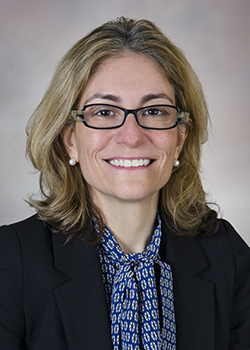Provider Spotlight: Dr. V. Liana Tsikitis
March is National Colorectal Cancer Awareness Month, and this month’s Provider Spotlight features an expert in the subject. V. Liana Tsikitis, M.D., M.C.R., M.B.A., serves as the Division Head of Gastrointestinal and General Surgery at OHSU. Her expertise is in digestive health and surgery, with a special focus on anal cancer, colorectal cancer, and cancer research. Learn more about Dr. Tsikitis and what brought her to pursue this field of study, as well as some of the people who have Inspired her along the way.

Tell us a little bit about yourself.
I grew up in the historic city of Athens, Greece, and then moved to the States for college. My favorite childhood memories consist of large family gatherings over delicious dinners. Today I enjoy spending time with my family rooting for the Blazers and Timbers.
What made you decide to become a doctor?
I always loved science and biology, and I thought I wanted to pursue a career in molecular oncology. However, I realized that I was missing interacting with people in a more meaningful manner. The field of medicine let me pursue both my love for research and treating people.
You specialize in digestive health, with a special focus on surgery and cancer. What made you pursue those areas?
I pursued surgery because of the hands-on approach and the ability to provide relief to a person in a short period of time. Additionally, as a medical student I knew I wanted to pursue oncology as a field. Ultimately I chose colorectal surgery as my specialty since it combines GI surgery and oncology.

What is something you wish women could know about colorectal cancer, specifically?
Colorectal cancer affects men and women equally, and patients with colon cancer experience no symptoms in the early stages of the disease. When symptoms appear, they'll likely vary, depending on the cancer's size and location in the large intestine. It is curable in the early stages, and it is extremely important to get screening when recommended. Also, it is important not to ignore symptoms that include blood in the stool and bowel habit changes.
Statistics show that only around 20% of surgeons are female. Do you have any advice for women who are entering or in male-dominated fields, in medicine or otherwise?
It is unfortunate that women still have to fight for recognition and equity in the field of surgery. Although women now comprise more than half of medical school enrollees, they are scarce in many surgical fields. In addition, women are often subjected to gendered expectations about work-life balance and are consequently steered away from a career that could take time away from raising children. Finding good mentors and a support network are keys to success. I often emphasize to my female students and residents that they can have a life outside surgery as I often bring up other topics of my life including my research interests and being a mother of an active nine-year-old.
Dr. Tsikitus is truly one of the quadruple threats in medicine – she is a skilled surgeon, a master educator, a successful researcher, and a strong leader. Though women in medicine are growing, women in surgical specialties, and women in leadership positions in surgical specialties are still quite rare. She is working to change the culture in medicine via her strong personal relationships as well as in her leadership roles. She is a fierce advocate for women in medicine and touches more lives than she likely realizes. We are lucky to have her here at OHSU. - Dr. Johanna Warren, Director, Center for Women's Health
March is also Women’s History Month; who has inspired you?
I have been inspired by many women leaders. A couple that come to mind are Margaret Thatcher and Ruth Bader Ginsburg, not necessarily for their politics but for their grit and perseverance. I chose the field of surgery because of a remarkable woman, Amy Goldberg, a trauma surgeon who mentored me as a medical student. Now, almost twenty years later, she serves as the interim Dean of my alma mater. During my fellowship, I was fortunate to be mentored by another outstanding woman surgeon, Heidi Nelson, an OHSU trainee, who became the first female chairperson of the Department of Surgery, where I completed my fellowship. She is now the Director of the Cancer Programs for the American College of Surgeons. I feel fortunate to have these highly deserving women as role models and mentors.